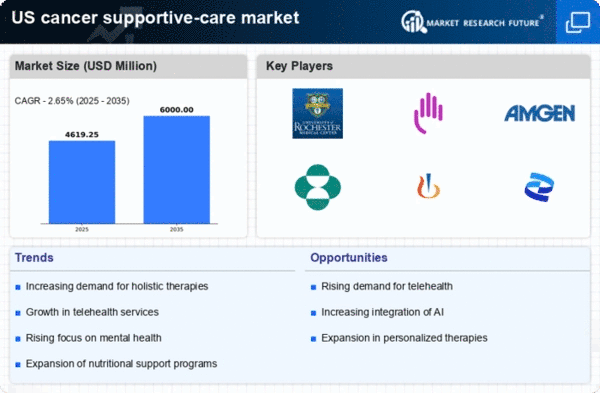Rising Incidence of Cancer Cases
The cancer supportive-care market is experiencing growth due to the rising incidence of cancer cases in the US. According to the American Cancer Society, approximately 1.9 million new cancer cases are expected to be diagnosed in 2025. This alarming trend necessitates enhanced supportive care services to address the physical and emotional challenges faced by patients. As the population ages and risk factors increase, the demand for comprehensive supportive care solutions is likely to escalate. This includes pain management, nutritional support, and psychological counseling, all of which are essential components of the cancer supportive-care market. The increasing number of cancer survivors also contributes to the market's expansion, as long-term care and follow-up services become critical for improving quality of life.
Advancements in Treatment Modalities
Innovations in cancer treatment modalities are significantly impacting the cancer supportive-care market. With the introduction of targeted therapies and immunotherapies, patients often experience unique side effects that require specialized supportive care. For instance, the use of immunotherapy has been associated with immune-related adverse events, necessitating tailored supportive interventions. The cancer supportive-care market must adapt to these advancements by providing services that address the specific needs arising from new treatment regimens. As treatment options evolve, the market is likely to see an increase in demand for supportive care services that can effectively manage these complexities, ensuring that patients receive holistic care throughout their treatment journey.
Growing Awareness of Palliative Care
There is a growing awareness of the importance of palliative care within the cancer supportive-care market. Palliative care focuses on improving the quality of life for patients with serious illnesses, including cancer. This approach emphasizes symptom management, psychological support, and coordination of care, which are essential for patients and their families. As healthcare providers and patients recognize the benefits of palliative care, the demand for these services is expected to rise. The National Hospice and Palliative Care Organization reports that more healthcare facilities are integrating palliative care into their cancer treatment programs, indicating a shift towards a more patient-centered approach in the cancer supportive-care market.
Increased Funding for Cancer Research
Increased funding for cancer research is driving advancements in the cancer supportive-care market. Government initiatives and private sector investments are focusing on improving cancer treatment and supportive care services. For example, the National Cancer Institute's budget has seen significant increases, allowing for more comprehensive studies on supportive care interventions. This funding not only supports research but also facilitates the development of new therapies and supportive care strategies that enhance patient outcomes. As research progresses, the cancer supportive-care market is likely to benefit from evidence-based practices that improve the overall care experience for patients, ultimately leading to better health outcomes.
Emphasis on Patient-Centered Care Models
The cancer supportive-care market is witnessing a shift towards patient-centered care models, which prioritize the individual needs and preferences of patients. This approach encourages active participation from patients in their care decisions, fostering a sense of empowerment and satisfaction. Healthcare providers are increasingly adopting strategies that involve multidisciplinary teams to address the diverse needs of cancer patients, including physical, emotional, and social aspects of care. The integration of patient feedback into care planning is becoming more common, which may enhance the effectiveness of supportive care services. As this trend continues, the cancer supportive-care market is expected to evolve, focusing on personalized care that aligns with patients' values and goals.
















